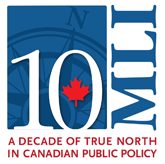
The Claim:
A deepfake video and a series of websites featuring fictitious interviews between Toronto Star journalist Raisa Patel and Canada’s Finance and Deputy Prime Minister, Chrystia Freeland, have been published to promote a so-called “get-rich-quick” bitcoin operation called “Gas Profit.”
In the deepfake YouTube ad video, Chrystia Freeland has been made to appear as if she is endorsing an online automated resource trading platforms called “Gas Profit”. A news anchor appears to claim that Canadians who signup and “invest” $350 will be guaranteed a return of $6000 within a week.
The fake Toronto Star interview linked to the website in the deepfake video, claims that “any Canadian citizen who invests 250 $ will be able to earn over 7000 $ per day”. The fake interview is used to give the false impression that the fraudulent platform is endorsed by the Canadian government and that “investors” will not lose any of their money. The fake article then outlines how viewers can sign-up for the fraudulent plaform.
The Facts:
This deepfake video and story are promoting an investment trading platform scam. This has become an emerging issue in many Western nations, where fake news articles and deepfake videos of public figures endorse fraudulent trading platforms on social media. Deepfake videos can be detected by monitoring for synchronization issues between the lips of the deepfake subject and audio of the subject’s voice. In this case, the audio of Ms Freeland speaking frequently goes out of synch with the movement of her lips.
The deepfake video features links to websites that include Ms Freeland’s name in the URL. Multiple URLs and websites featuring identical fake Toronto Star articles were set up by those behind this campaign. The URLs, which were all registered at the same time through an Iceland based company called Name Cheap, include:
- chrystiaapp.com
- freelandprostart.com
- chrystiasfans.com
When these URLs are clicked on within the video or on their own, they lead to the fake Toronto Star article.
Users who click on links leading to these URLS and the fake Toronto Star article may not always be aware of the article’s fraudulent nature.
Similar ads to the one featuring Ms Freeland have been appearing on social media platforms, linking to hoax articles on websites designed to resemble The Toronto Star. Like the fake Chrystia Freeland articles, earlier ones featured fictitious interviews with Canadian personalities, such as Amanda Lang, to promote websites promising get-rich-quick schemes. A real Toronto Star article published on May 24, 2024, explains that these websites use “fake news articles and images of well-known television personalities to promote their service. It’s a technique similar to the so-called ‘deep fake’ clips, where artificial intelligence (AI) is used to create digitally manipulated videos of television personalities, politicians, and other well-known individuals that appear real.”
Such ads, when published on popular platforms like YouTube, expose Canadians to possible fraud, and may target and prey on economically vulnerable Canadians.
The Australian National Anti-Scam Centre has outlined how these deepfake trading platforms scams work:
- Scammers entice victims through social media advertisements, deepfake videos on video sharing platforms and fake online news articles about celebrities and well-known public figures claiming to make substantial money from online trading platforms.
- This fake click bait will link to a scam website where victims are prompted to enter their details. This is the gateway for communication between the scammer and victim.
- Scammers ask for a small investment of around $250 via credit card to provide access to the trading platform.
- Scammers will often ask the new investor to download a third-party trading platform via the relevant app store or provide the investor with login details for an online dashboard.
- After showing profits through a dedicated online dashboard, scammers persuade their victims to invest more. Sometimes scammers will allow victims to make a small withdrawal early in the scam to build trust.
- When the victim eventually tries to withdraw their funds, scammers will ask for withdrawal fees or cite tax implications to obtain more money. Some victims have reported being locked out of their account.

